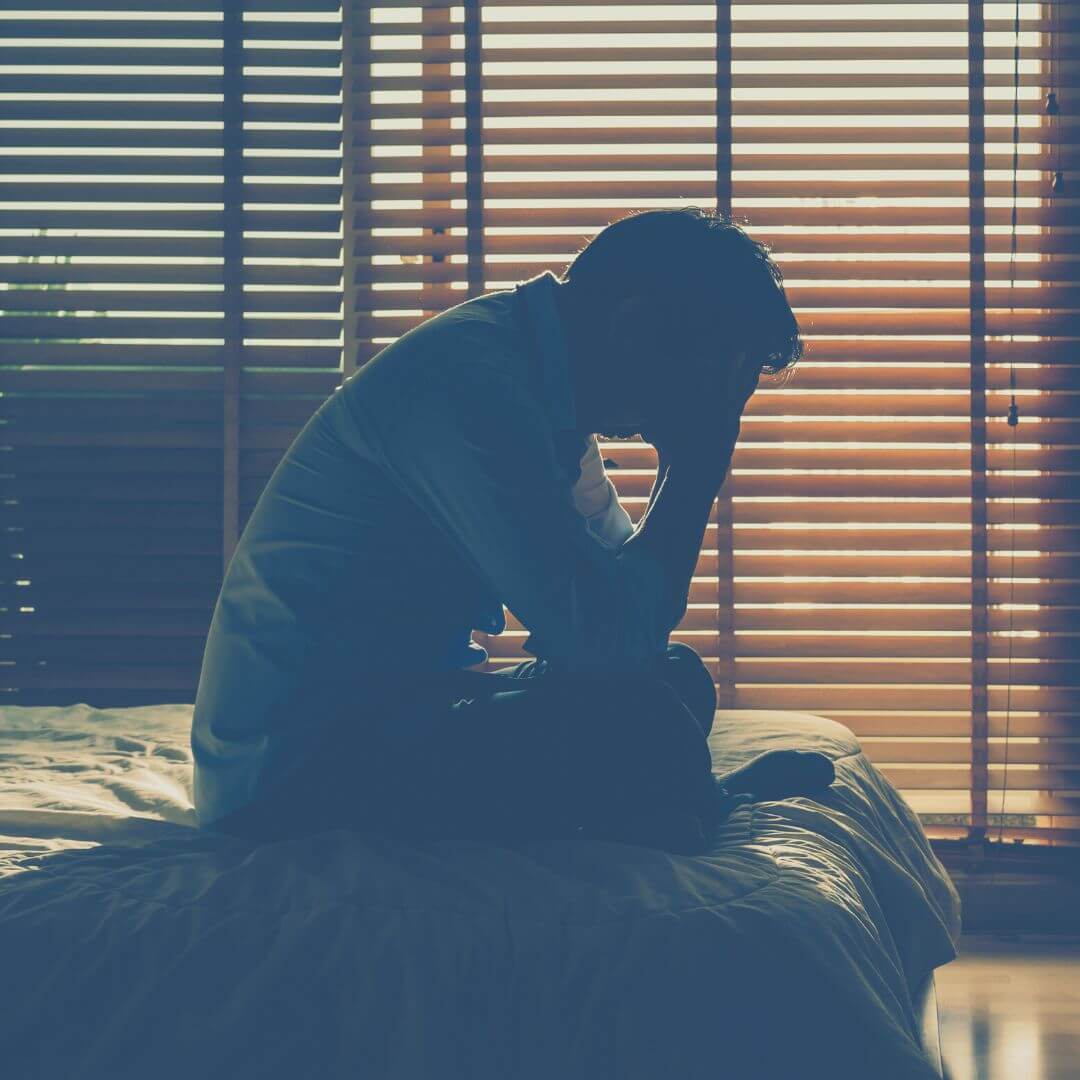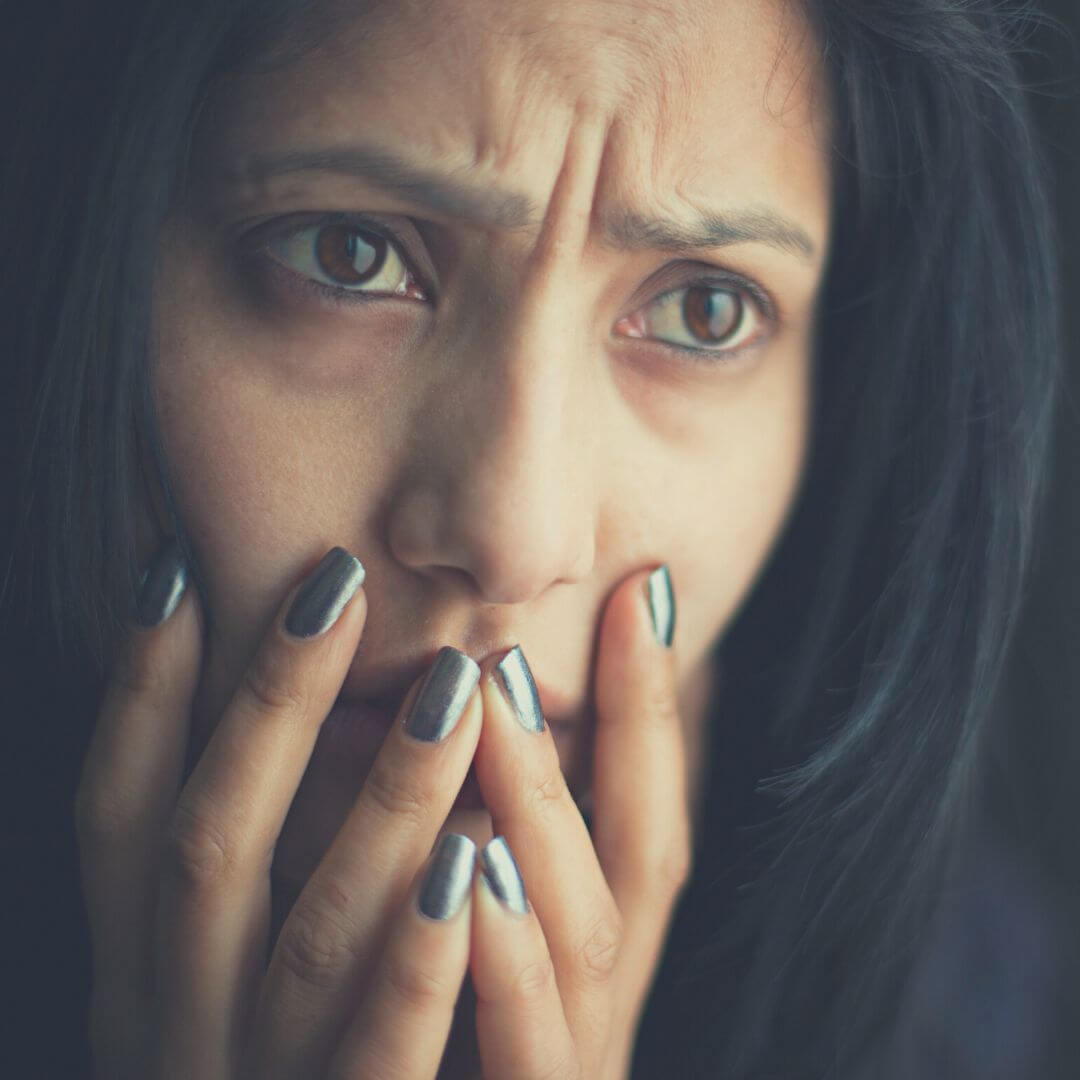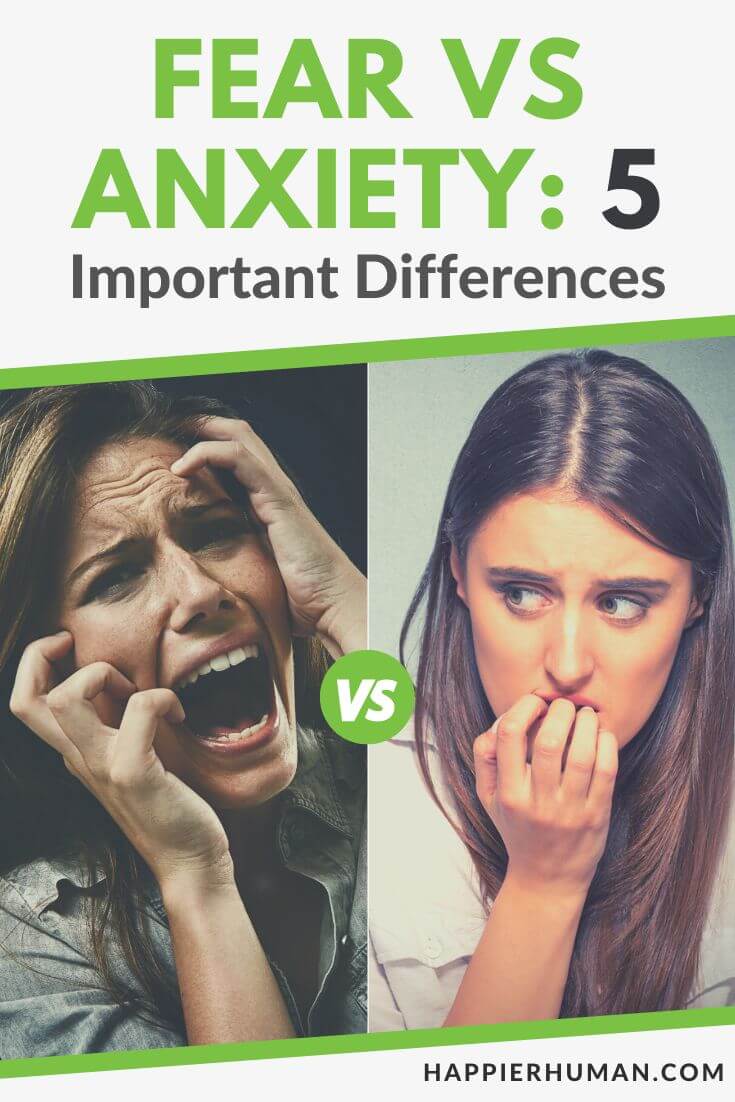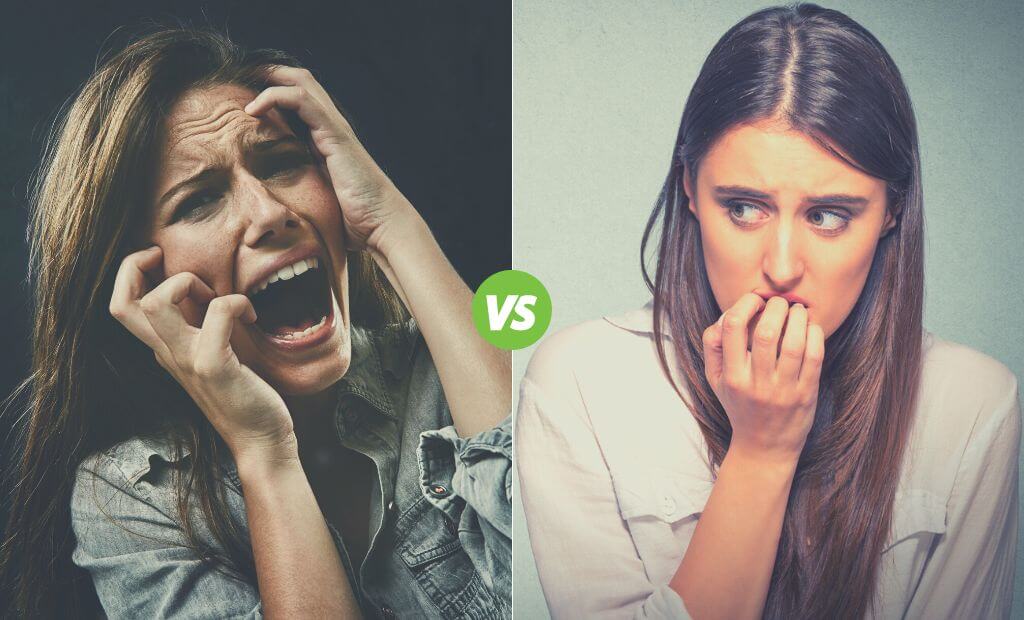Confusing fear with anxiety is a rather easy thing to do, and mental health experts have a clearer understanding as to why. There are similarities between the two. For instance, both fear and anxiety are processed in an area of the brain called the amygdala.
The amygdala is responsible for regulating our fight (cope with) or flight (escape) reactions to stress caused by threatening stimuli.
Although frightening, fear plays a critical role in human survival… anxiety does not. As you’ll soon discover, fear and anxiety are vastly different. By the time you get to the final thoughts on fear vs anxiety, I hope you're well-equipped to spot the important differences, learn how to manage the symptoms, and know when to seek help.
What Is Fear?
Fear is a normal and natural response to threats or danger in your environment, whether real or imagined. The threat functions as an alert that activates the amygdala, resulting in physical, psychological, or behavioral responses. People may experience fear when walking in dark or unknown locations or at the sight of animals they think are dangerous.
Common reactions include racing heartbeat, tightening of the muscles, sweating, and feelings of anxiety. Blood pressure also increases. Fear can also range from mild to extreme fears, also known as phobias.
Your body reacts this way in preparation to combat the threat or escape it (fight or flight response). Although fear is helpful, irrational fears or phobias can impair daily functioning.
What Is Anxiety?
Occasional anxiety is a normal and sometimes beneficial part of life that presents itself as general worry over matters of everyday life. For instance, feeling nervous or worried about money, family, health, or how you’ll perform at an upcoming job interview.
If anxiety symptoms prolong or become intense and debilitating, it could be a sign of an anxiety disorder. Common types include generalized anxiety disorder, social anxiety disorder, panic disorder, and phobias. A phobia is a persistent, excessive, irrational, and debilitating fear of a person, animal, object, or situation.

Anxiety disorder is considered a mental health condition and is diagnosed in adults and children. The disorder affects 40 million adults in the U.S. (19.1%) according to the National Alliance on Mental Illness (NAMI).
If you have anxiety, it may cause you to feel tense, restless, panicked, and fearful. Other symptoms include shortness of breath, rapid heartbeat, elevated blood pressure, and tightness in the chest. These symptoms can make it difficult for you to get through your day.
5 Differences Between Fear vs Anxiety You Should Know About
Difference #1. Fear is an emotion, while anxiety is a fear response
Fear is an emotion. Over a century ago, psychologist Paul Ekman made it clear that fear was one of the initial six basic and universal emotions. The revelation came as a surprise to many who thought fear was a feeling.
Although there's no well-defined definition for emotion, the American Psychological Association (APA) generally describes it as brief episodes of physical, psychological, and behavioral responses to events and situations, such as real and specific danger. The APA notes that fear is not the same as feelings and mood.
Understanding that when you sense fear, you're simply sensing an emotion, is significant. The knowledge enables you to relax and process the emotion until it passes. Keeping fear in check can mean reducing the chance of fear triggering an anxiety episode.
Difference #2. Fear is caused by threats, but anxiety is caused by stress
Fear is the product of a real or perceived threat and a basic survival reaction to threats of physical, emotional, or psychological harm.
On the other hand, stress, which is also regulated by the amygdala, plays a key role in the activation of anxiety symptoms. Everyone experiences stress and it can come from multiple sources such as work, school, financial trouble, relationships, illness, trauma, and your general surroundings.
As you can see, it's not easy to avoid. Stress responses are necessary for helping us take action when our physical, emotional, or psychological well-being is under threat. Fortunately, stress from normal routines is usually short-lived stress. In some cases, it plays beneficial roles such as motivating performance and achievement of goals, making you more alert, and improving memory.
However, severe or long-lasting stress may result in anxiety disorders. Finding useful strategies to manage and cope with life stressors can help reduce the impact of anxiety on your health and overall quality of life.
Difference #3. Fear is a physical reaction, whereas anxiety is more psychological
Fear is often a sudden and intense reaction to a feeling of immediate danger. You might freeze or run when confronted by the fear stimulus. As soon as the threat is no longer there, you'll feel relieved and able to return to your normal activities.
On the other hand, anxiety is worry that causes you to feel nervous or dread that something may or may not happen. These feelings can be triggered suddenly and at any time. The symptoms can also persist and lead to feeling apprehensive or constantly on the lookout for danger (hypervigilance).
Interestingly, fear is a common anxiety trigger that causes similar symptoms, such as increased blood pressure, a rise in heart rate, and rapid breathing. Stress is also an integral part of the brain and body's response to fear and other anxiety triggers.
These factors may explain why many people have trouble figuring out whether they are experiencing fear vs anxiety.
Difference #4. Fear is short lived, while anxiety can prolong
Emotions in general are automatic but fleeting responses to stimuli in your environment and fear isn't an exception. Fear can last for a few seconds or longer. It typically doesn't last for hours. If this happens, then the sensation is more likely a mood and not an emotion.

This is according to the article, “Characteristics of Emotions: What Science has Taught us About Emotional Experiences.”
Once you become aware that you're gripped by fear, you can reassess the situation to reduce the accompanying sensations. For example, feeling cold, trembling, shortness of breath, or muscle tension.
On the contrary, anxiety can persist for hours, weeks, or months and long after the trigger is removed. Prolonged symptoms can lead to difficulties carrying on daily activities. You may also become increasingly fearful of places, situations, or things that you believe trigger the condition.
Fear isn't helpful in this case, as it can lead to avoidance, isolation, or other unhealthy forms of coping, e.g., substance abuse.
Difference #5. Fear keeps you safe, but anxiety doesn't
When you feel fearful, your brain is attempting to protect you from something. You may not always immediately know or see what the threat is, since the emotion is automatic and instinctive.
For the most part, fear is a healthy and positive human emotion intended for our protection, even though it can interfere with everyday activities if it becomes irrational, severe, or persistent.
When it comes to safety, anxiety can actually create unsafe situations that affect your physical and mental health. Imagine needing to get something done that is necessary for your health, such as a dental or surgical procedure.
Even though these procedures may pose no harm or threat to life, excessive worry about the procedure can trigger an avoidance response.
Anxiety can also put you in harm's way when performing tasks such as driving or operating heavy machinery.
How to Cope with Fear and Anxiety
Chronic fear or anxiety can have long-term consequences on health and your ability to enjoy a normal life. There are numerous ways to manage fear and anxiety disorders, including the following:
Other self-help methods can include getting enough sleep and staying away from drugs and alcohol.
Fear vs Anxiety: When to Seek Help
Talk to your health care provider if your self-help attempts to cope aren't working. Your provider may refer you to a mental health professional for evaluation and treatment. It might be time to seek help if fear and anxiety:
Fear and anxiety treatment
Anxiety and fear disorders can be treated using a combination of psychotherapy and medication. Therapists typically start with therapy, such as cognitive-behavioral therapy (CBT), as the first line of treatment. Medications may be prescribed if psychotherapy isn't as effective on its own.

Exposure therapy (ET) has also proven to be effective for chronic fears, anxiety disorders, and phobias. Both CBT and ET focus on uncovering and addressing the root causes and triggers of anxiety and fear.
Your therapist may include alternative treatment approaches such as mindfulness-based stress reduction (MBSR) therapy and relaxation techniques. At home, you can continue your self-help routines to maintain a calm and relaxed lifestyle.
Where to find a Mental Health Professional
More than likely, your doctor will refer you to a particular mental health therapist. If not, locating one can be as easy as popping online and searching for a “therapist near me.”
Your search will show you clinics in your area within walking or driving distance, addresses, websites, and phone numbers.
Another option is checking reliable online databases provided by the American Psychological Association (APA) or Anxiety and Depression Association of America (ADAA).
Final Thoughts on Important Differences Between Fear vs Anxiety
Fear and anxiety are normal experiences of everyday living and are helpful in certain situations. However, they can interfere with your health and well-being. Luckily, there are simple self-help methods to cope with these problems, many of which often prove effective.
Conversely, professional help is also available if you're unable to manage the symptoms on your own. Reach out and talk to your doctor today if you aren’t able to cope… they can help you put an end to the vicious cycle of sleepless nights and physical and emotional distress.
You may also want to try reading our article on 21 Prayers for Your Anxiety and Fear as part of your coping strategies. Daily prayers and affirmations are a great way to start or end the day when you’re feeling anxious.


